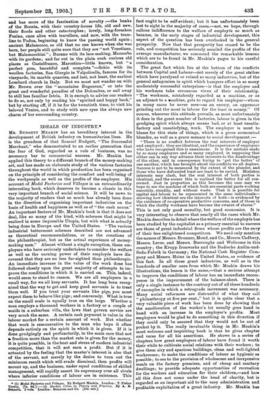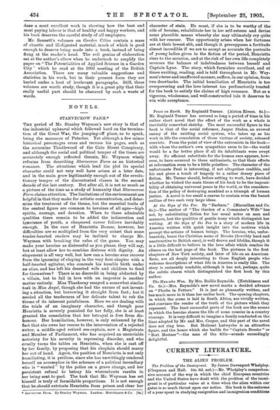Merchant," who demonstrated to an earlier generation that the fear
of God, regarded as a rule of business, was no
necessary bar to commercial success. Mr. Meakin has applied this theory to a different branch of the money-making art, and has made an elaborate study of the various factories throughout the world in which production has been organised on the principle of considering the comfort and well-being of the workpeople as well as the profits of the employer. His account of Model Factories and Villages is an extraordinarily interesting book, which deserves to become a classic in this very important branch of social science. It will be news to the majority of readers that so much has already been done in the direction of organising important industries on the basis of health and happiness as well as of " the cash nexus." An important feature of Mr. Meakin's book is that it does not deal, like so many of the kind, with schemes that might be realised in some impossible Utopia, but with what is actually being done in Europe and the United States. " The various industrial betterment schemes described are not advanced as theoretical recommendations, or as the creations of the philanthropist, but as the actual experience of money- making men." Almost without a single exception, those em- ployers who have seriously undertaken to consider the welfare as well as the earning power of their employes have dis- covered that they are no less far-sighted than philanthropic. An immediate increase in the value of the work done has followed closely upon the great majority of attempts to im- prove the conditions in which it is carried on. This, indeed, would seem to stand to reason. We are all employers in a small way, for we all keep servants. It has long been recog- nised that the way to get and keep good servants is to treat them well. If you treat your servants like pigs, you must expect them to behave like pigs ; and conversely. What is true on the small scale is equally true on the large. Whether a man employs a thousand workers in a factory or a couple of maids in a suburban villa, the laws that govern service are very much the same. A certain cash payment is value in the labour market for a certain amount of work. But whether that work is remunerative to the man who buys it often depends entirely on the spirit in which it is given. If it is done grudgingly and perfunctorily, in the main care that not a fraction more than the market rate is given for the money, it is quite possible, in the heat and stress of modern industrial competition, that it will not earn a profit. But if it is actuated by the feeling that the master's interest is also that of the servant, not merely by the desire to turn out the minimum result which will evade dismissal, then profits will mount up, and the business, under equal conditions of skilled management, will rapidly assert its supremacy over all rivals where inferior conditions of labour are in existence. This * (1) Model Factories and Vulages. By Budgett liffeakiii. London : T. Fisher Unwin. [7s. ild.]—(2) Garden Cities in Theory and Practice. By A. B. Sennett. 2 vole. London: Ben rose and Co. [21$. net.]
because, in the early stages of industrial development, this aspect of the question has been overlooked in the general prosperity. Now that that prosperity has ceased to be the rule, and competition has seriously assailed the profits of the average manufacturer, we commend the remarkable lessons which are to be found in Mr. Meakin's pages to his careful consideration.
The great fact which lies at the bottom of the conflicts between Capital and Labour—not merely of the great strikes which have paralysed or ruined so many industries, but of the general antagonism in spirit which hampers effort in so many moderately successful enterprises—is that the employer and his workmen take erroneous views of their relationship. " The workman, mistakenly regarded as a machine, or as an adjunct to a machine, gets to regard his employer—whom in many cases he never sees—as an enemy, an oppressor grinding out the most in labour for the least in money." Of course, wherever this attitude prevails, as most unfortunately it does in the great number of factories, labour is given in the grudging spirit which always means bad, or at least unsatis- factory and unsatisfying, work. The employer is most to blame for this state of things, which is a gross economical blunder, as well as a grave menace to social development :-
"There is no conflict between the real interests of employer and employed ; they are identical, and the experience of employers who have recognised this is unanimous. It is the mistake made by so many employers and so many employed, in supposing that either can in any way advance their interests to the disadvantage of the other, and in consequence trying to ' get the better' of one another, which has brought about the conflicts we all deplore. Success is not to be measured by the extent of the plunder, and those who have defrauded least are least to be envied. Mistaken interests may clash, but the real interest of both parties is identical, and the sooner this is realised the better for all con- cerned. Just in proportion as this becomes the case may we- hope to see the machine of which both are essential parts working smoothly, steadily, and without waste. That it is possible for capital and labour to be represented in the same individuals— showing how identical are the interests of both—is evidenced by the existence of co-operative productive concerns, and of those in which the thrifty workmen have become the owners of shares."
This is not only good morality, but good economics. It is very interesting to observe that nearly all the cases which Mr.
Meakin describes in detail where the welfare of the employes has been studied by the capitalist as a primary essential to success are those of great industrial firms whose profits are the envy of their less enlightened competitors. We need only mention the names of Messrs. Brunner, Mond, and Co., Messrs. Cadbury, Messrs. Lever, and Messrs. Burroughs and Wellcome in this country ; the Krupp Ironworks and the Badische Anilin-und- Soda-Fabrik in Germany ; the National Cash Register Com- pany and Messrs. Heinz in the United States, as evidence of this fact. In all these great industries, as well as in the hundreds of smaller ones from which Mr. Meakin draws his illustrations, the lesson is the same,—that a serious attempt to improve the conditions of labour has an immediate recom- pense in the improvement of the balance-sheet. There is only a single instance to the contrary out of all these hundreds of examples in which a retrograde movement was necessary. Many social reformers are distrustful of what they call " philanthropy at five per cent.," but it is quite clear that a very valuable piece of work has been done by showing that the amelioration of the worker's lot usually goes hand in hand with an increase in the employer's profits. Most employers would be glad to do something in this direction if they could only be assured that they would not be out of pocket by it. The really invaluable thing in Mr. Meakin's most welcome and inspiriting book is that he gives chapter and verse for all his assertions. He shows in a series of chapters how great employers of labour have found it worth their while to cultivate social relations with their workers ; to give them airy and spacious buildings, clean and well-lighted workrooms; to make the conditions of labour as hygienic as possible ; to see to the provision of wholesome and inexpensive meals on the factory premises, and of cheap and sanitary dwellings; to provide adequate opportunities of recreation for the workers and education for their children,—and how all this does not come under the head of charity, but is regarded as an important aid to the easy administration and
profitable exploitation of a great industry. Mr. Meakin has Mr. Sennett's volumes on Garden Cities contain a mass of chaotic and ill-digested material, much of which is good enough to deserve being made into a book, instead of being flung at the reader's head. The evil genius of elaboration sat at the author's elbow when he undertook to amplify the paper on " The Potentialities of Applied Science in a Garden City " which he read at the 1903 meeting of the British Association. There are many valuable suggestions and statistics in his work, but in their present form they are buried under a host of irrelevant paragraphs. Still, these volumes are worth study, though it is a great pity that their really useful part should be obscured by such a waste of words.
NOVELS.











































 Previous page
Previous page